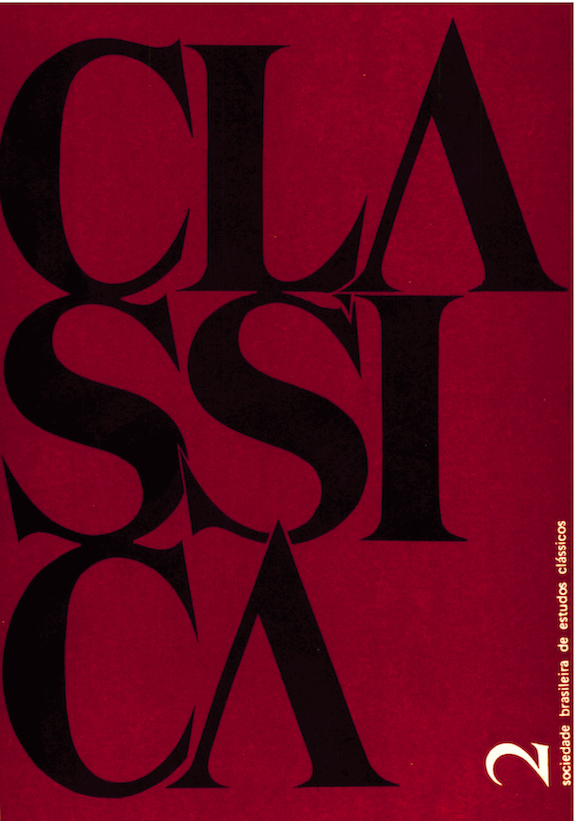O significado de Theós em grego
DOI:
https://doi.org/10.24277/classica.v2i1.631Resumo
This paper deals with the Greek word "theós" in diferent levels. 1. Its etymological origin, not yet clearly elucidated; but the authors generally agree that it means "something bright". 2. "Theós" as predicative name, being used near masculine, feminine and neutral words, meaning "something beautiful" or "something terrible". 3. In Homer's work we find two significances, namely (theós) is applied to the anthropomorphical gods and to prominent persons. 4. Among the Romans, "theós" assumes the same significance as described in the preceding item. 5. Finally “theós" is studied in different Greek phliosophers, since Xenophanes, Heraclit and others, until Philon of Alexandria. The paper tries to demonstrate the effort of mankind, represented by vigorous thinkers, to find a steady foundation that justifies the human existence.Downloads
Referências
BAILLY, R. Dictionnaire des synonymes de la langue française. Paris: Larousse, 1973.
BÉNAC, H. Dictionnaire des synonymes. Paris: Hachette, 1956.
BLOCH. E. Atheismus im Cristentum. Frankfurt am Main: Suhrkamp. 1968.
BROCKAUS-LEXIKON. Wiesbaden und München. Brockhaus, 1982.
BUSCH. E. God is God: the Meaning of a Controversial Formula and the Fundamental Problem of Sepaking about God. The Princeton Seminary Bulletin, Princeton, v. VI1, n. 2, p. 101-113, 1986.
COBET, C. Diogenis Laertii vitae philosophorum. Parisiis: Firmin-Didot, 1929.
DESSAUER, F. Wissen und Erkenntnis. Olten: O. Walter, 1946.
GRABNER-HAIDER, A. Vocabulario práctico de la Biblia. Barcelona: Herder, 1975.
GRESCHÉ, A. La création: cosmologie et antropologie. Revue Théologique de Louvain, Louvain, v. 2, p. 147-166, 1983.
HIRSCHBERGER, J. Historia de la filosofia. Barcelona: Herder, 1952. t.1.
HOMÈRE. Odyssée. Paris: Hachette, 1917.
HOMMER. Odyssee. Wiesbaden; Berlin: Vollmer, s.d.
ID. Ilias Wiesbaden. Berlin: Vollmer, s.d.
JAEGER. W. Paideia. São Paulo: Martins Fontes, 1979.
KERÉNYI, K. Antike Religion. Munchen-Wien: Langen-Muller, 1971.
KITTEL, G. Theologisches Wörterbuch zum Neuen Testament. Stuttgart: W. Kohlhammer, 1957. B. 3.
LEWIS, C. T. A Latin Dictionnary. Oxford: Clarendon, 1951.
LEXIKON Für Theologie und Kirche. Freiburg: Herder, 1960.
MARTIN, J. P. La primera exegesis ontológica de Yo soy el que es (Ex. 3.14). Stromata, Madrid, v. XXXIX, p. 93-115, 1983.
MENGE-GÜTHLING. Grieschisch-deustsches Hand - und Schulwörterbuch mit besonderer Berücksichtigung der Etymologie. Berlin: Langenscheidtsche, 1936.
MEURERS, J. Die Frage nach Gott und die Naturwissenschaft. München: Pustet, 1962.
MONDOLFO, R. O pensamento antigo. São Paulo: M. Jou, 1973.
PETERS, F. E. Termos filosóficos gregos. Lisboa: C. Gulbekian, 1983.
PETTAZZONI, R. La religion dans la Grèce antique. Paris: Payot, 1953.
SPADAFORA, F. Diccionario Bíblico. Barcelona: Litúrgica española, 1959.
TOMLIN. F. Les grands philosophes de l'Orient. Paris: Payot, 1952.
ULLMANN, R. A. A teologia de Epicuro. Veritas, Porto Alegre, v. 32, p. 499-509, 1987.
ZELLER, E. Cornpendio di storia dell filosofia grega. Firenze: Vallecchi, 1931.
ZUBIRI, J. Cinco lecciones de filosofia. Madrid: Alianza, 1985.
Downloads
Publicado
Edição
Seção
Licença
Autores que publicam nesta revista concordam com os seguintes termos:
a. Autores mantém os direitos autorais e concedem à revista o direito de primeira publicação, com o trabalho simultaneamente licenciado sob a Creative Commons Atribuição 4.0 Internacional (CC BY 4.0) que permite o compartilhamento do trabalho com reconhecimento da autoria e publicação inicial nesta revista.
b. Autores têm autorização para assumir contratos adicionais separadamente, para distribuição não-exclusiva da versão do trabalho publicada nesta revista (ex.: publicar em repositório institucional ou como capítulo de livro), com reconhecimento de autoria e publicação inicial nesta revista.
c. Autores têm permissão e são estimulados a publicar e distribuir seu trabalho online após o processo editorial (ex.: em repositórios institucionais ou na sua página pessoal), já que isso pode gerar alterações produtivas, bem como aumentar o impacto e a citação do trabalho publicado (Veja O Efeito do Acesso Livre).
d. Autores autorizam a cessão, após a publicação, de seu conteúdo para reprodução em indexadores de conteúdo, bibliotecas virtuais, bases de dados de acesso público e similares.











